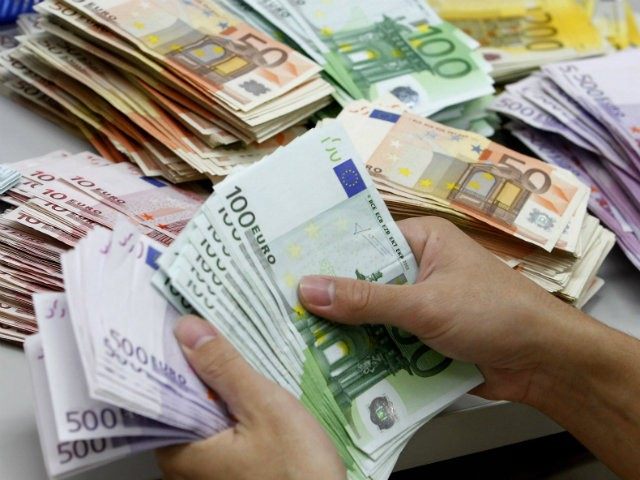China’s Producer Price Index (PPI) that measures the price changes for the goods and services produced by the nation has fallen for 32 straight months. As the factory to the world, China has been exporting deflation. The economic impact has been increasing the real burden of debt, driving down worldwide wages and discouraging consumption.
At over one billion dollars of imports a day, the European Union (EU) is suffering the most havoc from deflation as China’s largest export market. With China’s PPI falling every month since April 2012, European Union inflation has consistently fallen and, in December, actually turned negative at -.02 percent for the first time since the 2009 recession.
The European Central Bank (ECB) has aggressively responded to the threat of deflation by pursuing a traditional Keynesian strategy of dramatically expanding the money supply to flood the economy with cash and drive down interest rates. The ECB expected their flood of “cheap cash” would increase borrowing and convince consumers to immediately purchase goods in order to avoid paying inflated prices in the future.
But relentless imported deflation from China has overwhelmed ECB’s economic stimulus efforts. Despite driving European bond yields down to the lowest level since the 14th Century, unemployment is rising and wages are falling. Frustrated by the failure of their stimulus, ECB economists are now blaming the markets for being “unhinged.”
The pain of deflation is not being shared equally among the 28 member nations in the European Union. As a bloc, the EU runs a trade surplus +2.5 percent. But that is only because almost half of Germany’s GDP comes from exports, while only about a quarter of Greek and Spanish GDP are driven by exports. Germany has run big trade surpluses every year since 2000, while Greece has run trade deficits every year since 2000.
Trade competitiveness explains why unemployment in Germany is only 5 percent, but it is 26 percent in Greece. With domestic companies unable to compete against deflating Chinese imported goods, businesses have shed employees or gone bankrupt. Greek consumption has been crushed as people hoard what money they do have.
By subscribing, you agree to our terms of use & privacy policy. You will receive email marketing messages from Breitbart News Network to the email you provide. You may unsubscribe at any time.
The Greek government has tried to offset deflation with public spending, but that has caused the nation’s public debt as a percent of GDP to jump to 175 percent. To make interest payments, the government increased taxes, but that hurt business and has caused more unemployment.
The London Telegraph‘s Ambrose Evans-Pritchard wrote an article this week titled “EMU deflation is the final betrayal of Southern Europe.” He commented that “Deflationary forces have been gaining a grip on all the crisis states [Greece, Portugal, and Spain] of the South for 18 months.” He worries that Europe is in a vicious cycle of “underemployment equilibrium,” where the increasing burden of debt and falling wages feed back through the economy to cause even less consumption.
Economist Irving Fisher warned in his 1933 book, “Debt-Deflation Theory of Great Depressions,” that “falling prices are not benign in highly-leveraged economies.” Fisher researched the U.S. economic crises of 1837, 1873, and 1929–1933 to understand the commonality to deflationary episodes over America’s first 150 years. He found that a normal recession can turn into a deflationary disaster for an over-indebted economy.
Chinese exported deflation has been a disaster for the Southern European “crisis states” of Greece, Portugal, and Spain for several years. But with total public and private debt across Europe rising from 320 percent of GDP in 2000 to 470 percent of GDP today, Chinese deflation is now a crisis for all the European states.

COMMENTS
Please let us know if you're having issues with commenting.